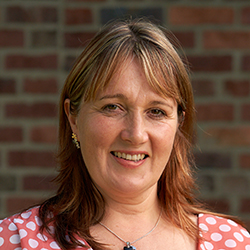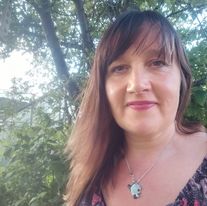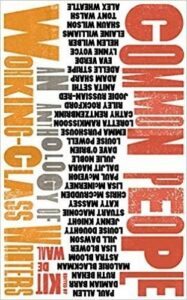
JULIA LEE BARCLAY-MORTON – YOGA, WATER AND REWRITING AUTISM
I interviewed writer Julia Lee Barclay-Morton about her experience of autism. Julia began as an experimental dramatist in New York, moving to the UK to


I interviewed Yorkshire author and broadcaster Julie Noble about her successes in three writing competitions – the Northern Writers Award 2019, Arvon Gold Dust Award and Moniack Mhor Two Roads – and her Radio 4 show ‘My Name is Julie’, in which she interviewed people closely involved with disadvantaged families experiencing Summer Learning Loss because of lockdown.
Leslie: How did you put together ‘My Name is Julie’? What did you learn about the issue and presenting this kind of radio material & working with worried people?
Julie: It was great to get the call about the programme. I was daunted at first at the idea of presenting and interviewing, but the producer Philippa assured me I would be fine and we put many hours into making sure it was, rehearsing questions before the interviews, recording hours of talking with the interviewees, who were great and fascinating to talk to.
The subject was Summer Learning Loss, so in our first lengthy, lively conversation Philippa and I discussed the bare bones of what we wanted to cover, then we had thinking time where we kept messaging ideas across to each other over several days.
I researched the topic and looked into studies of Summer Learning Loss that had been done over previous years, then turned to reports about this year with the long break caused by lockdown. As a lone parent who had lost income, the aim of the programme was to highlight our personal challenges, which were huge, because my regular paid jobs all stopped in lockdown, and I had legal issues from my divorce still ongoing, so there was no respite.
The programme discussed financial pressures on parents, how the mental health of children is impacted by their parents’ stress, the need for free school meals and also how social distancing would affect the way teachers could interact with the children. This was quite an emotional experience. Having spoken to some of the experts about the possible long-term implications, I became more anxious about the effects on my own children and others who have struggled through this year.
I learnt a great deal about how many worried people are trying to change things for the better, either through university research, parliament, or promoting social change, but that there is not enough airtime given to their views on the news or general media. During a two-hour interview, Professor Greta Defeyter made suggestions that would have long-term positive impact on our whole society, and Robert Halfon also had pertinent suggestions about the curriculum. The toughest part of making the programme was taking out these great insightful comments to cut to a thirty-minute length. There was much more that could have been said, for instance about the effects of increased online gaming on the nation’s physical and mental health, and also concerns about food poverty.
The programme got great comments on Twitter and feedback from the commissioning editor about my ‘refreshing’ voice that was ‘perfect’ for this programme as it gave a personal, ‘articulate’ line of enquiry instead of just figures and case notes.
In fact I found it was almost too personal at times. On one day we went for a walk so that Philippa could do some external recording. That occasion she wanted to talk about why I lived here and why I was having to move – financial reasons due to the divorce. It was a surprise to me how much it hurt, especially when I was stood looking out to sea, remembering great times staying here with my Grandma in my childhood. Philippa and I discussed moving from the area I loved. This landscape represents a spiritual and emotional place of wellbeing for me, so it was upsetting to think we had to move due to legal bills and I did end up crying. That’s in the programme, which aired 7.9.20 and is on BBC Sounds.
Leslie: Could you describe how you’ve avoided being didactic when you write TV/radio scripts about social issues, please?
Julie: I had the benefit of being selected for a great course run by New Writing North in 2017. Significant Ink Screenwriting had top tutors Danielle Jawando, Chris Neilan and Ishy Din. All were successful writers who thought it was important to say something ‘about the human condition’. They were fascinating to listen to, because they were good at explaining how to make the screenplays exciting, while surreptitiously teaching the issues hidden within.
The key is to have characters the viewer empathises with, but then ramp up the pressure and the obstacles as much as possible. The greater the risk of loss, the greater the tension, and the more dramatic and intense the television, and the bigger impact of the message. If the character is learning about the issue along the way, perhaps as part of a ‘quest’ plotline where key points are discovered, then so is the viewer.
Ishy also advised making the viewer question the main protagonist. For instance a flawed character could do something badly wrong, which could turn the viewer against them, but then redeem themselves.

Every character has goals that the audience should want them to achieve, but the story might demand something different. If a character does not get what they want, then the viewer might find that more relatable. However, if you want the audience to be satisfied, then if a main protagonist has a negative outcome, it should ultimately take them onto a better path. When trying to write about social issues it is better to get authentic experience in, whether from yourself or others, for example if you see an item on the news, you can do research to use real stories and information as inspiration.
Leslie: Can you tell us what happened with the Northern Writers Award, Arvon Gold Dust Award and Moniack Mhor Two Roads, and what you’ve learned as a writer from them?
Julie: I have entered the Northern Writers Award every year for several years so it was an amazing surprise to get the congratulatory email from Will Mackie: ‘the judges were very impressed with your stories, appreciating the strong narrative voices, the quality writing and controlled style’. 2019’s award winners were extra lucky as we were invited to go to Newcastle to a celebratory ceremony. I took my daughter and we had a delightful night meeting other writers and their family members, listening to the stories behind each winner, and doing a quiz. In light of Covid I am grateful we got that memorable time.
Afterwards I prepared my story collection in order that The Literary Consultancy could assess the manuscript. I had natural concerns about what the reader would say, but it was a great report, extremely encouraging. Kit Caless said that some of the stories were ‘absolutely outstanding’. She gave critical pointers about improvements which I did before sending a shortened version of the collection to a couple of opportunities this year. I find it useful to keep sending work out as it can give helpful feedback and if you win or are placed somewhere it’s important for your writing CV especially when trying to find an agent. When people ask me for advice I always recommend looking out for good competitions because it teaches you about meeting word counts and deadlines.
Winning the Arvon Gold Dust Award gave me immense benefits as a writer, Without the grant this would have been impossible to attend as I’m a single mum on a low income. The five nights away at The Hurst was the longest time I have been away from home in many years and it gave me a dedicated time, place and space to write, think and plan. It was a marvellous opportunity to meet other writers, to hear their work, listen to their queries and learn from the advice given to them during workshops by the excellent tutors. During the workshops I was able to consider new styles and try different technical approaches in the ‘content-harvesting’ writing exercises. Several were particularly useful for bringing out new strands of thought and work.
The vast array of available books gave me the opportunity to read some of the words of the Hurst’s previous owner John Osborne to the group one night when we were on a free night. We had many interesting discussions over meals and in breaks and during our leisure time, it was enlightening to hear the different perspectives and have lots of talk about writing.
When we had free time, I was able to have space to walk and think. This gave my mind a chance to ‘breathe’ because so much of my real life it is oppressed by many pressures. At Arvon I had freedom to wander around on my own in perfect safety. Not only did I think about writing, I started thinking about my life on a huge level.
Moniack Mhor is the first creative writing course provider I’ve seen that offered childcare, I was so impressed. It’s such an innovative idea and ideal for single parents such as myself. After a difficult divorce, the children are my priority, so the chance to take them solved lots of practical issues for me.
There were many benefits. Headspace away from a house where we had some stressful issues and the peaceful wonderful space of Scotland. The tutoring and classes were intense and inspiring and the children adored ‘Forest School’. The time at Moniack Mhor was a terrific, reviving experience for all three of us. The opportunity to talk with other writers was fantastic and the fact that they all had children with them, even the tutors, made the group a shared ‘family’ style atmosphere which was magical at times.
Leslie: What have you learned as a writer from these Awards?

Julie: The main thing is not to give up! Keep sending work out, because when something is selected and your writing is noticed, it is an incredible feeling!
Winning the Northern Writers Award gives you, as they told us at event the year before I won, ‘access to Will’. Will Mackie is one of the team at New Writing North, but there are other jewels there too, Claire Malcolm and Anna Disley spring to mind immediately. Being able to approach the team for advice and suggestions is a huge help, and one of the most important parts of winning the Award, as they encourage an ongoing relationship, which is invaluable.
The courses I won with the other awards were excellent learning experiences because there were one-to-one sessions with the tutors – two in each location, all successful writers. Each tutor gave individual feedback which included comments about my writing, my attitude and where they could see my writing and life experiences taking me. My writing has developed in that it feels more solid, there are foundations of style and content to work from, and a visible outcome I did not have before. My confidence has increased because of the tutors’ support. This has made me envisage a positive future I would never have pictured by myself. Since the courses ended, I’ve also kept in touch with other participants, which is great for peer support and encouragement to keep improving.
Leslie: How has being from Yorkshire shaped your outlook and creativity?
Julie: Great question! It has affected my creativity in a similar way to that of the Brontës. I am inspired by the wild, beautiful moors and being able to see the sea where I live. Walks in the fresh air always lift my spirits, and living in this area, where I can see the farms where my father and grandfather were born, has built my resilience as a person and as a writer. The land grounds me, as it did Charlotte Brontë, who is a particular inspiration. There’s a sense of timelessness in the moors, which I think is lost in many modern cities. There are ancient roads and tracks that connect you to the past and provide evidence of previous inhabitants such as Romans, Vikings and Bronze Age. This is great for a writer’s mind, very inspiring!
Regarding my outlook about being from Yorkshire, this has changed since I was published in Kit de Waal’s acclaimed anthology ‘Common People’. Because of work promoting that, I found out how often people warm to my Northern accent. At the Primadonna festival in August 2019, which was a wonderful, welcoming experience, several people commented on it and how my tone gave a sense of warmth that engaged people more than a different accent might have done. On the Radio 4 programme, my Yorkshire voice was described as ‘refreshing’ and ‘articulate’. These positive comments made me feel more confident as a speaker on the panels and the radio, which is really helpful.
As a working-class lone parent, on a low income, from the North, before that programme I felt powerless to change things for the better. Being from a disadvantaged family, as mine statistically and financially is, affects children and parents, but being one of the ‘Common People’ and having these new opportunities to speak out is making me realise I can make a difference. In the future I’m hoping to work with a group of writers who have experienced domestic abuse, so it would be great to pass on what I have learnt these past eighteen months.
Next week I interview Mary J. Oliver about her debut novel Jim Neat, which uncovers the secret history of her father as a vagrant in Canada.
ABOUT LESLIE TATE’S BOOKS:

I interviewed writer Julia Lee Barclay-Morton about her experience of autism. Julia began as an experimental dramatist in New York, moving to the UK to

I interviewed Gillean McDougall from Glasgow, who edited the collaborative projects Honest Error (on Charles Rennie Mackintosh and his wife Margaret Macdonald) and Writing the

I interviewed French writer Delphine de Vigan, whose book, No et moi, won the prestigious Prix des libraires. Other books of hers have won a clutch

I interviewed Joanne Limburg whose poetry collection Feminismo was shortlisted for the Forward Prize for Best First Collection; another collection, Paraphernalia, was a Poetry Book Society Recommendation. Joanne

I interviewed Katherine Magnoli about The Adventures of KatGirl, her book about a wheelchair heroine, and Katherine’s journey from low self-esteem into authorial/radio success and
| Cookie | Duration | Description |
|---|---|---|
| cookielawinfo-checkbox-analytics | 11 months | This cookie is set by GDPR Cookie Consent plugin. The cookie is used to store the user consent for the cookies in the category "Analytics". |
| cookielawinfo-checkbox-functional | 11 months | The cookie is set by GDPR cookie consent to record the user consent for the cookies in the category "Functional". |
| cookielawinfo-checkbox-necessary | 11 months | This cookie is set by GDPR Cookie Consent plugin. The cookies is used to store the user consent for the cookies in the category "Necessary". |
| cookielawinfo-checkbox-others | 11 months | This cookie is set by GDPR Cookie Consent plugin. The cookie is used to store the user consent for the cookies in the category "Other. |
| cookielawinfo-checkbox-performance | 11 months | This cookie is set by GDPR Cookie Consent plugin. The cookie is used to store the user consent for the cookies in the category "Performance". |
| viewed_cookie_policy | 11 months | The cookie is set by the GDPR Cookie Consent plugin and is used to store whether or not user has consented to the use of cookies. It does not store any personal data. |
2 responses
This is an interesting post, Leslie. I enjoyed learning about Julie, her life and her writing. I would like to know more about what initiatives are being put in place to bridge the gap created by the lockdown with the learners.
Hi Robbie. As always, I’m indebted to you for retweeting and commenting! I’ll bear in mind what you say about bridging gaps. If I have an interviewee who knows about it, I’ll ask the question!